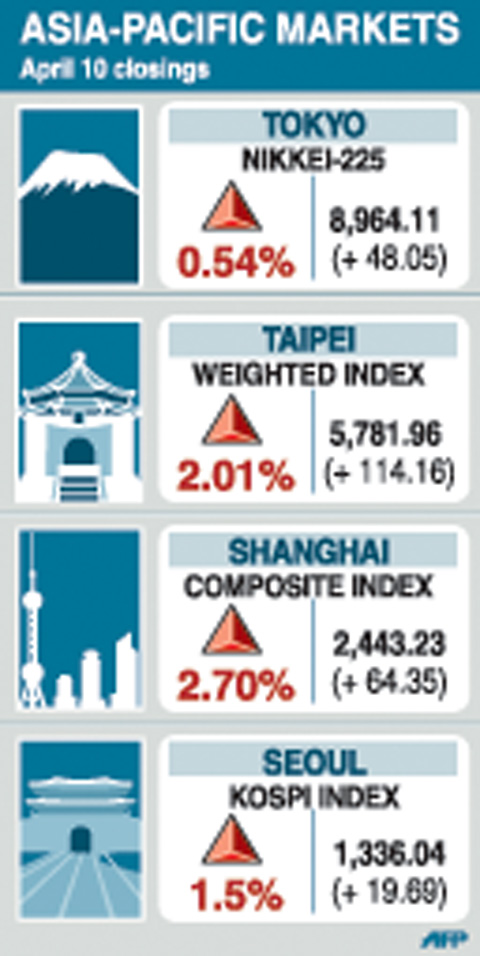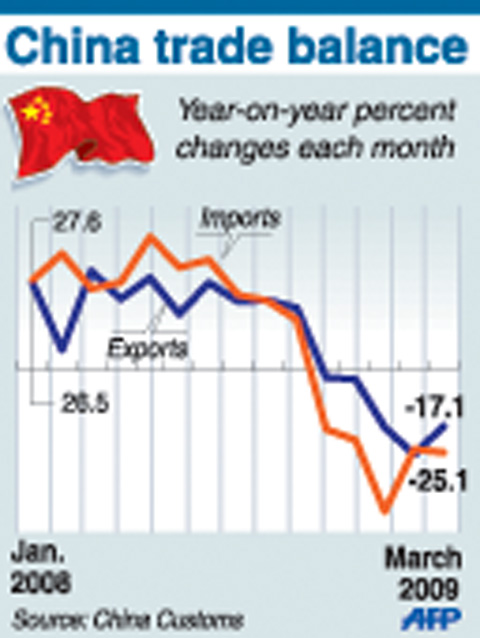Asian stocks climbed for a fifth week, the longest streak of gains since February 2007, as Japan proposed a US$154 billion stimulus package and investors speculated the global recession is abating.
Orix Corp, Japan’s largest non-bank financial company, rallied 26 percent as Japan’s Prime Minister Taro Aso said he envisioned a stimulus package that would create 2 million jobs.
AU Optronics Corp (友達光電), the world’s third-biggest maker of liquid-crystal displays, climbed 12 percent as panel shipments jumped. Mazda Motor Corp, Japan’s second-largest car exporter, surged 33 percent, aided by the yen’s fall to a five-month low.

The MSCI Asia-Pacific Index climbed 1.5 percent this week to 87.97, the highest since Jan 12. Asian markets joined global stocks in a fifth weekly advance, lifting the MSCI benchmark from a six-year low.
“Spring has finally come to the market,” said Yoshihiro Ito, senior strategist at Okasan Asset Management Co, which oversees about US$9.3 billion. “We’ve seen indicators that suggest the economy is bottoming out. People’s view on the economic outlook is gradually turning optimistic and this is leading to the rebound in the equity market.”
Japan’s Nikkei 225 Stock Average gained 2.5 percent. South Korea’s KOSPI index added 4.1 percent as the strengthening won eased the foreign currency debt burden of lenders, including Woori Finance Holdings Co. India’s SENSEX added 4.4 percent amid easing inflation.

China’s central bank said yesterday that its foreign exchange reserves rose 16 percent from a year earlier to US$1.95 trillion by the end of last month, but growth slowed in the first quarter as exports and foreign investment slumped.
China’s reserves, already the world’s largest, increased by US$7.7 billion in the first quarter — US$146.2 billion less than during the same period last year, the People’s Bank of China said in a notice on its Web site.
The rise compared with a fourth-quarter increase of almost US$45 billion, Xinhua reported.
Nearly half of China’s foreign exchange reserves are invested in US treasuries and notes issued by other government-affiliated agencies. Chinese Premier Wen Jiabao (溫家寶) called on the US last month to safeguard those assets as America’s largest creditor.
The reserves last month increased by US$41.7 billion — US$6.7 billion more than the same period last year.
Exports fell 17 percent last month from a year earlier, the fifth straight monthly decline, but less severe than February’s 25.7 plunge, the sharpest in a decade, the customs agency reported on Friday. It said trade “showed clear signs of improvement.”
Imports fell by 25.7 percent, widening the Chinese trade surplus to US$18.6 billion from February’s US$4.8 billion gap.
Taiwanese share prices are expected to turn volatile next week as dealers look to the US corporate earnings season, which may dictate Wall Street’s movements, dealers said on Friday.
It remains to be seen whether foreign institutional investors will continue their buying after a strong market showing this week as it seems to be time for them to adjust their portfolios, they added.
While technical hurdles may cap market upside or even pull the index down next week, high liquidity in the market is expected to prevent it from falling below 5,500 any time soon, dealers said.
Stiff technical resistance is expected at around 5,900 points.
For the week to Friday, the weighted index rose 252.33 points or 4.56 percent to 5,781.96 after a 2.58 percent increase a week earlier.
Average daily turnover stood at NT$144.05 billion (US$4.26 billion), compared with NT$122.78 billion a week ago.
“The local bourse has made eye-popping gains in the recent weeks, outperforming regional markets,” Grand Cathay Securities Corp (大華證券) analyst Allen Lin said.
Since the beginning of last month, the weighted index has risen almost 27 percent.
Markets in Australia, Hong Kong, India, Indonesia, New Zealand, the Philippines and Singapore were closed for public holidays on Friday.

MORE VISITORS: The Tourism Administration said that it is seeing positive prospects in its efforts to expand the tourism market in North America and Europe Taiwan has been ranked as the cheapest place in the world to travel to this year, based on a list recommended by NerdWallet. The San Francisco-based personal finance company said that Taiwan topped the list of 16 nations it chose for budget travelers because US tourists do not need visas and travelers can easily have a good meal for less than US$10. A bus ride in Taipei costs just under US$0.50, while subway rides start at US$0.60, the firm said, adding that public transportation in Taiwan is easy to navigate. The firm also called Taiwan a “food lover’s paradise,” citing inexpensive breakfast stalls

TRADE: A mandatory declaration of origin for manufactured goods bound for the US is to take effect on May 7 to block China from exploiting Taiwan’s trade channels All products manufactured in Taiwan and exported to the US must include a signed declaration of origin starting on May 7, the Bureau of Foreign Trade announced yesterday. US President Donald Trump on April 2 imposed a 32 percent tariff on imports from Taiwan, but one week later announced a 90-day pause on its implementation. However, a universal 10 percent tariff was immediately applied to most imports from around the world. On April 12, the Trump administration further exempted computers, smartphones and semiconductors from the new tariffs. In response, President William Lai’s (賴清德) administration has introduced a series of countermeasures to support affected

CROSS-STRAIT: The vast majority of Taiwanese support maintaining the ‘status quo,’ while concern is rising about Beijing’s influence operations More than eight out of 10 Taiwanese reject Beijing’s “one country, two systems” framework for cross-strait relations, according to a survey released by the Mainland Affairs Council (MAC) on Thursday. The MAC’s latest quarterly survey found that 84.4 percent of respondents opposed Beijing’s “one country, two systems” formula for handling cross-strait relations — a figure consistent with past polling. Over the past three years, opposition to the framework has remained high, ranging from a low of 83.6 percent in April 2023 to a peak of 89.6 percent in April last year. In the most recent poll, 82.5 percent also rejected China’s

PLUGGING HOLES: The amendments would bring the legislation in line with systems found in other countries such as Japan and the US, Legislator Chen Kuan-ting said Democratic Progressive Party (DPP) Legislator Chen Kuan-ting (陳冠廷) has proposed amending national security legislation amid a spate of espionage cases. Potential gaps in security vetting procedures for personnel with access to sensitive information prompted him to propose the amendments, which would introduce changes to Article 14 of the Classified National Security Information Protection Act (國家機密保護法), Chen said yesterday. The proposal, which aims to enhance interagency vetting procedures and reduce the risk of classified information leaks, would establish a comprehensive security clearance system in Taiwan, he said. The amendment would require character and loyalty checks for civil servants and intelligence personnel prior to